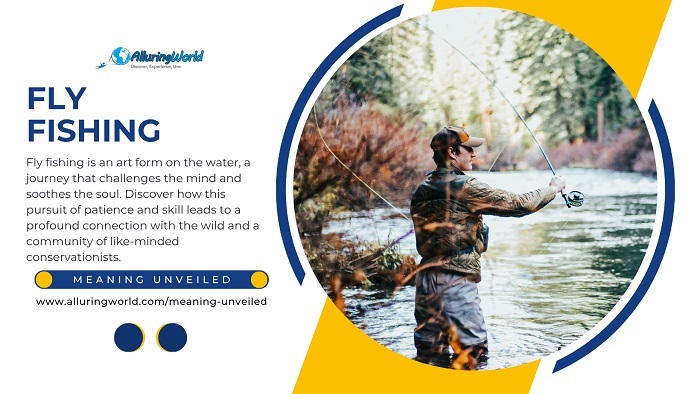Read time ca. 5 minutes
Fly fishing stands out as one of the most captivating and fulfilling outdoor experiences, blending technique, patience, and an intimate connection with nature. Unlike traditional fishing methods, fly fishing uses specialized gear and a unique casting style that often feels more like an art form than a sport. For many, it’s about the meditative rhythm of the cast, the beauty of remote waters, and the knowledge required to understand fish behavior and aquatic ecosystems. Whether pursued in mountain streams, lakes, or saltwater flats, fly fishing offers a profound sense of adventure and reward that goes beyond the catch.
To put it simply, fly fishing is a method of angling where the angler uses an artificial fly as bait, rather than live bait or a lure. The fly is a handcrafted imitation of an insect or other small aquatic creatures that fish naturally prey on. The key difference lies in the casting technique. Instead of relying on the weight of the bait to cast the line, fly fishing uses the weight of a specialized, thick fly line to propel the nearly weightless fly forward. This creates a graceful, back-and-forth motion that allows the angler to present the fly delicately on the water’s surface, making it appear as natural as possible to the fish. This unique process is what sets fly fishing apart from other forms of fishing.
A Blend of Art and Skill:
Fly fishing is often described as an art because of the graceful casting techniques and hand-tied flies that imitate natural insects. Anglers spend time perfecting their casts to land a nearly weightless fly precisely where it needs to be, often amid challenging water conditions. Each movement is intentional, requiring a combination of strength, finesse, and rhythm. The flies themselves are intricately crafted, using feathers, threads, and synthetic materials to resemble mayflies, caddisflies, or other prey. These elements make fly fishing a creative and skillful pursuit that demands continuous learning and practice.
Immersion in Nature’s Beauty:
One of the most captivating aspects of fly fishing is the way it draws people into some of the most scenic and untouched environments on earth. Whether you’re standing in a misty mountain stream at dawn or casting into crystal-clear lakes surrounded by forests, the connection to the natural world is immediate and profound. For example, many anglers seek out immersive fly fishing trips in Pyramid Lake, where the stark desert landscape contrasts beautifully with the turquoise water and dramatic skies. These experiences are about slowing down, absorbing the quiet, and appreciating the raw, unfiltered beauty of nature in a way few other activities allow.
A Mindful and Meditative Practice:
Fly fishing requires intense focus, patience, and awareness, which are qualities that make it a naturally meditative practice. From observing insect hatches to reading water currents and anticipating fish behavior, the angler must remain fully engaged in the moment. The repetitive motions of casting and mending the line promote a sense of calm and rhythm, offering relief from stress and mental fatigue. Many people turn to fly fishing as a form of mindfulness or even therapy, using the slow pace and solitude as a way to reset their minds. Fly fishing provides mental clarity and emotional wellness, which makes it deeply fulfilling beyond physical activity.
Connection and Community:
Although often enjoyed in solitude, fly fishing fosters a strong sense of community among those who share the passion. Fly fishing clubs, guided trips, and conservation groups provide opportunities to learn from others, share stories, and collaborate on environmental efforts. The culture surrounding fly fishing values stewardship, mentorship, and storytelling. Whether you’re a beginner or a seasoned angler, there’s always room to connect with others who are willing to share techniques, advice, and enthusiasm. This sense of camaraderie adds a rewarding social dimension to the sport, reinforcing that fly fishing is about shared experiences and lasting friendships. In addition to all this, it is also an amazing outdoor activity for family bonding.
Challenges That Inspire Growth:
Fly fishing is not always easy, and that’s part of what makes it so rewarding. It challenges body and mind, asking anglers to learn how to read water, choose the right fly, and adjust techniques based on the behavior of wild fish. The unpredictable nature of weather, currents, and species can make every outing a learning experience. Success isn’t guaranteed, which teaches humility, perseverance, and adaptability. Each catch feels earned, each failure becomes a lesson, and these experiences build confidence and a deeper respect for the sport. The challenges of fly fishing contribute to personal growth and long-term satisfaction.
An Ethic of Conservation:
Fly fishing naturally aligns with a strong conservation ethic. Many fly anglers practice catch-and-release fishing and take active roles in preserving rivers, lakes, and marine habitats. Understanding fish behavior, life cycles, and aquatic environments fosters a deep respect for nature and a commitment to its protection. Organizations across the globe support restoration efforts, cleanups, and educational initiatives, with fly fishing communities often leading the charge. This connection to conservation enriches the sport by giving it a purpose that transcends recreation. Fly fishers often become stewards of the waters they love, ensuring that future generations can enjoy the same beauty and challenges.
Conclusion:
Fly fishing offers a uniquely rich and meaningful experience for those seeking more than just a sport. It combines artistry, challenge, mindfulness, and deep environmental awareness in a way that few outdoor activities can match. Whether you’re looking for solitude, community, or personal growth, fly fishing delivers a rewarding journey through nature’s most beautiful and serene waters.

